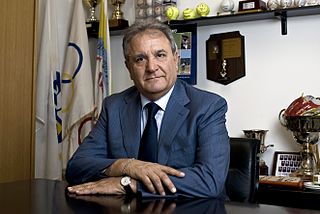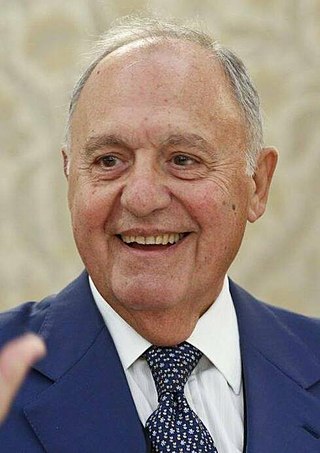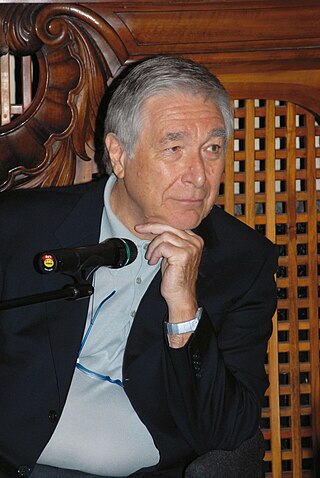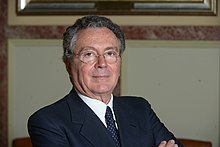
Luca Cordero di Montezemolo is an Italian businessman, former Chairman of Ferrari, and formerly Chairman of Fiat S.p.A. and President of Confindustria and FIEG. He comes from an aristocratic family from the region of Piedmont in Italy. He graduated with a degree in law from La Sapienza University in 1971. Afterward, he studied for a master's degree in international commercial law at Columbia University. He is one of the founders and former president of NTV, an Italian company which is Europe's first private open access operator of 300 km/h (186 mph) high-speed trains.

Libera Università Internazionale degli Studi Sociali "Guido Carli", known by the acronym "LUISS" or "LUISS Guido Carli", is a private university located in Rome, Italy, founded in 1974 by a group of entrepreneurs led by Umberto Agnelli, brother of Gianni Agnelli.

Carlo Scognamiglio Pasini is an Italian economist and politician. He is a university professor in applied economics, and was Chancellor of the LUISS University of Rome (1984–1992). He was President of the Italian Senate from 1994 to 1996 and Minister of Defence from 1998 to 2000.
Mario Ugo Arcelli was an Italian economist who at one time was Minister for the Budget in the Italian government.
Francesco de Leo, Ph.D. is an Italian business executive in the field of Information and Communications Technology with a particular focus on issues relating to Green ICT.
The Luiss School of Government - LuissSoG - is a graduate school of the LUISS Guido Carli University - Libera Università Internazionale degli Studi Sociali Guido Carli, a private university affiliated with Confindustria and based in the Italian capital Rome.

Riccardo Fraccari is a world sport administrator, holding various high-ranking positions, most notably as president of the World Baseball Softball Confederation and International Baseball Federation. In August 2016 under Fraccari, the International Olympic Committee voted to reinstate baseball and softball as Olympic sports for the Tokyo 2020 Games. He was elected WBSC president in May, 2014 for the first term, re-elected in July, 2022, for the second term, and after completing his first term from 2014 to 2021, is now currently serving a second full 7-year term.

Paolo Savona is an Italian economist, professor, and politician. He was the Italian Minister of European Affairs from 1 June 2018 until 8 March 2019, his second stint in government after 1993–1994. During the 2010s, Savona became one of the most fervent Eurosceptic economists in Italy.
Alessandro Pansa was an Italian business executive.

Paola Severino is an Italian lawyer, academic and politician.

Guido Carli was an Italian banker, economist, and politician. His father was the prominent fascist sociologist Filippo Carli.
Paolo Cuccia is an Italian businessman.

Massimo Egidi is an Italian economist. He is Professor of Economics at Libera Università Internazionale degli Studi Sociali Guido Carli in Rome and former rector of the university. With Axel Leijonhufvud is co-director of CELL, the Laboratory of Computable and Experimental Economics. His main research interests are related to the study of boundedly rational behaviors in organizations and institutions.

Michel Martone is an Italian jurist and academic. He was Deputy Minister for Labor and Welfare from 29 November 2011 to 28 April 2013. On his first assignment, his delegations were active and passive labor market policies, youth employment, vocational training, industrial and labor relations.
Gustavo Piga, is an Italian economist. He is professor of Political economy at University of Rome Tor Vergata.

Marco Magnani is an Italian economist.

Stefano Siragusa, is an Italian executive. He is Deputy General Manager of TIM.

Giovanni Lo Storto is the General Manager of Luiss Guido Carli University.

Marco Simoni is an Italian academic and public manager.
Dario Scannapieco is an Italian economist and business executive. Since June 2021 he has been CEO of Cassa Depositi e Prestiti.













